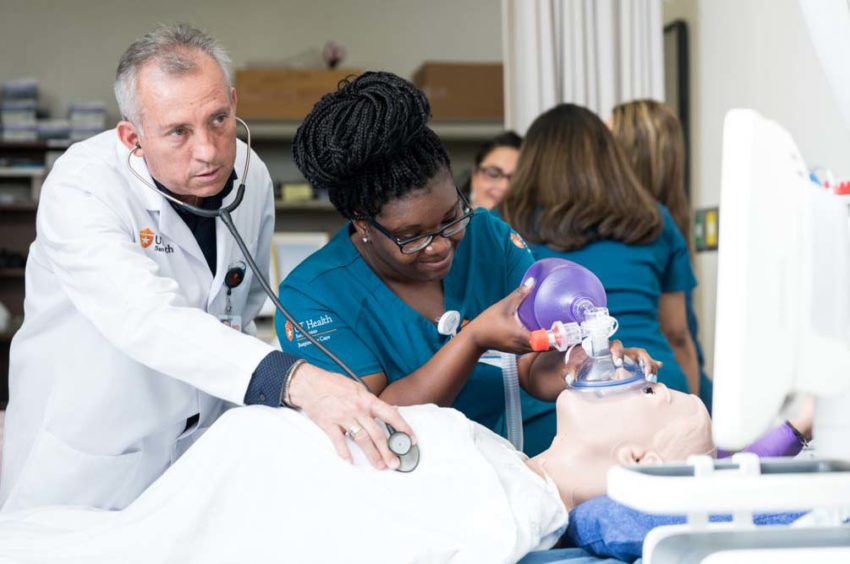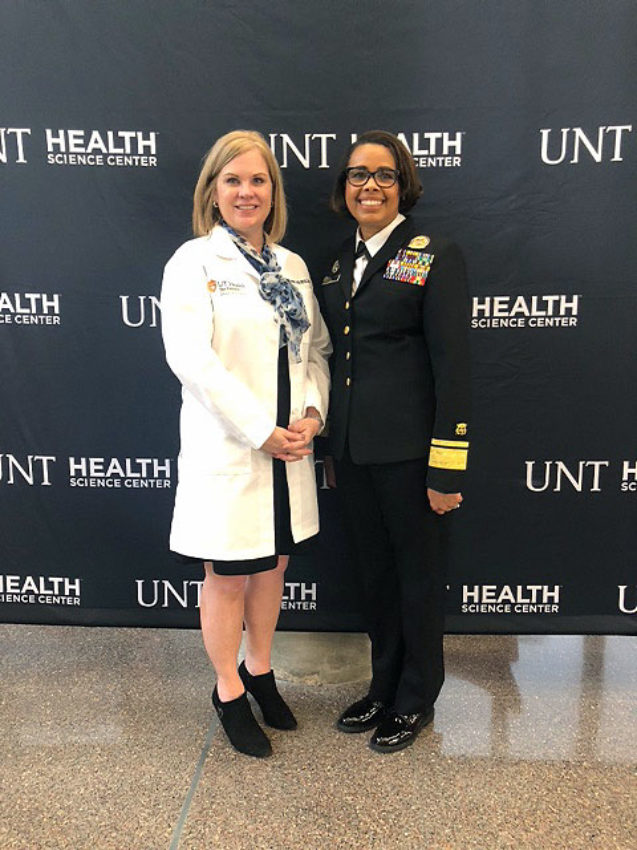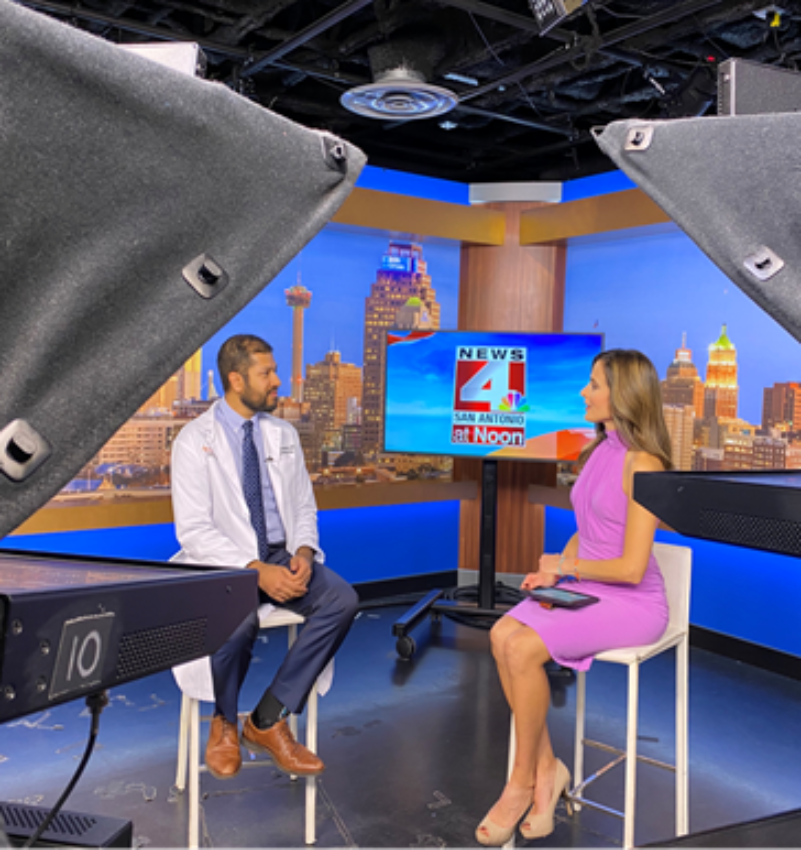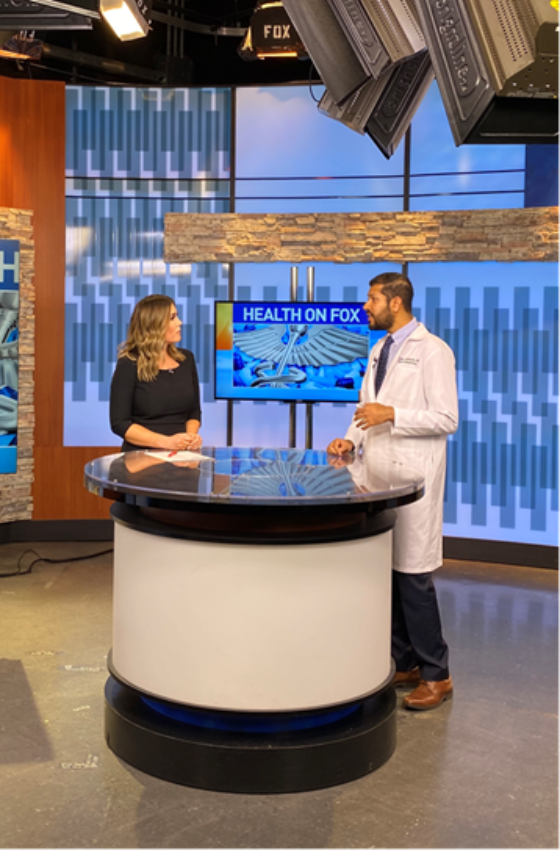Dr. Erin Mankus who is an assistant professor of obstetrics and gynecology at UT Health San Antonio, and works as an obstetrician and gynecologist explains why the HPV vaccine is key to prevent infection and cervical cancer.
UT Health San Antonio, UTSA partner to provide Respiratory Care Early Acceptance Program

Students looking for a high-paying profession with strong demand may want to consider respiratory therapy. With a new early acceptance program just announced by UT Health San Antonio and the University of Texas at San Antonio (UTSA), students could enter the field with both a bachelor’s and master’s degree in five years instead of the usual six.
“Not only will this save students money by skipping a year’s worth of undergraduate tuition, fees and living expenses, but they will have an extra year of earning a salary,” said David Henzi, Ed.D., associate dean for academic and student affairs in the UT Health San Antonio School of Health Professions.
The mean salary for respiratory therapists is $62,000, according to the U.S. Bureau of Labor Statistics, which projects a 21% increase in the need for respiratory therapists through 2028.
Respiratory therapists help patients improve their breathing. With the large number of Baby Boomers, many RTs will work with older people who have illnesses such as chronic obstructive pulmonary disease or with young children with breathing issues. Many of the jobs are in hospital emergency rooms, intensive care units and pediatric units, Dr. Henzi said.
“There is more demand because most people don’t know about respiratory therapists. They know about doctors and nurses, but just aren’t aware of this profession,” he said.
“Most respiratory therapists have an associate degree, but many employers are moving away from this and want employees with bachelor’s or master’s degree. This degree will prepare students for careers in management or as leaders in the clinical setting,” he said.
After completing the program, students will be awarded a bachelor’s degree in biology or kinesiology from UTSA and a master’s degree in respiratory care from UT Health San Antonio.
To be eligible, UTSA students must complete three years of the Bachelor of Science curriculum in biology or kinesiology, with an overall 3.0 GPA and 3.0 GPA in science classes, and submit an application. The application deadline for the first cohort is April 1. Once accepted, the UTSA students will begin the two-year the respiratory care master’s program at UT Health San Antonio.
Learn more about the Respiratory Care Early Acceptance Program.
San Francisco Chronicle: Living liver donors generously swap, saving 2 recipients
A major emphasis by the American Society of Transplant Surgeons is to increase organ donation in order to save the lives of patients suffering from end-stage organ failure. Currently, an estimated 15% of patients die while on the waiting list in the United States because there are insufficient organs to meet this lifesaving demand.
Decreasing the waiting list mortality requires more organs being procured from both deceased and living donors, which in turn requires innovation and organ preservation research. In San Antonio, Texas, transplant surgeons at the Long School of Medicine of The University of Texas Health Science Center at San Antonio innovated an effective approach to maximize the altruistic desire and contributions of living liver donors.
School of Nursing provides Narcan to UNT institutions to support lifesaving training
The death of a 24-year-old University of North Texas student from opioid overdose prompted a call for help in teaching North Texas-area faculty, staff, students and community members how to use Narcan, a medication that reverses overdoses.
The student, Holden Stucky, was the son of Alan Stucky, UNT System vice chancellor and general counsel.
Answering that call was Lisa Cleveland, Ph.D., RN, PNP, FAAN, from UT Health San Antonio’s School of Nursing. Dr. Cleveland and her team went to the UNT Health Science Center on Jan. 28 to provide 9,000 doses of Narcan nasal spray. Students there led a training on how to administer the medication.
Also attending the training was Rear Adm. Sylvia Trent-Adams, Ph.D., RN, FAAN, principal deputy assistant secretary for health in the U.S. Department of Health and Human Services.

Holden died in 2017 after receiving opioids to treat pain from a longboarding accident. His father, Alan, now carries Narcan wherever he goes, so he can administer the drug to someone at risk of overdosing.
Dr. Cleveland does the same.
“I always keep a dose in my purse. You never know when you may need it,” said Dr. Cleveland, also a mother of a college-age son.
Dr. Cleveland, an associate professor, completed her post-doctoral training at UNT. She has received millions of dollars from the Texas Health and Human Services Commission to manage Narcan training and to distribute the medication in communities throughout Texas. Training and Narcan can be obtained through the program’s website.
San Antonio Express-News: Ethnic groups are underrepresented in cancer drug development. San Antonio researchers are trying to change that.
Dr. Virginia Kaklamani, associate director of clinical research at UT Health San Antonio, and Dr. Chethan Ramamurthy, assistant professor of genitourinary medical oncology with UT Health San Antonio, were both interviewed by Lauren Caruba about the importance of clinical trials and which ones are critical to advancing the field.
Read the story.
Fox 29/News 4: Clinical trials to benefit patients
Dr. Chethan Ramamurthy, assistant professor of genitourinary (GU) medical oncology for Mays Cancer Center, educates the public on what clinical trials are, the impact and benefits of having patients enroll, and how the Mays Cancer Center is at the forefront of groundbreaking research in our community and beyond.
He explained the the misconceptions that people may have about clinical trials, the clinical trials currently taking place, and the significant impact the research can have on a patient’s life during two in-studio interviews on KABB/Fox 29 Midday News and WOAI/News 4 Noon News.
Watch the interview.



